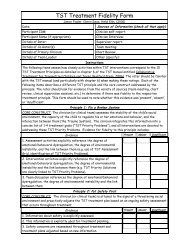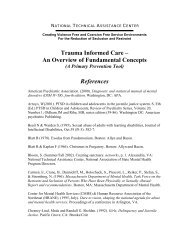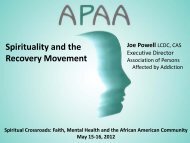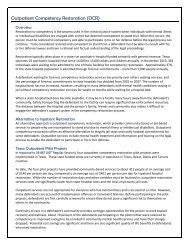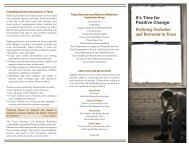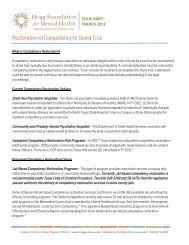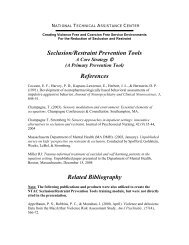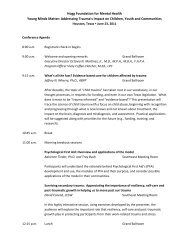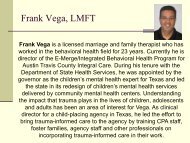US Air Force Integrated Care - Hogg Foundation for Mental Health
US Air Force Integrated Care - Hogg Foundation for Mental Health
US Air Force Integrated Care - Hogg Foundation for Mental Health
Create successful ePaper yourself
Turn your PDF publications into a flip-book with our unique Google optimized e-Paper software.
<strong>US</strong> <strong>Air</strong> <strong>Force</strong> <strong>Integrated</strong> <strong>Care</strong>:<br />
BHOP and Beyond<br />
Christine N. Runyan, Ph.D.<br />
Mid-State <strong>Health</strong> Center<br />
Plymouth, NH
Choosing a Model of Integration<br />
• Consider the population<br />
• Active duty military (and dependents)<br />
• Outsourcing services costs a lot of money<br />
• Goal is to maintain health and readiness<br />
• Early identification and prevention were the targets<br />
• A fully integrated care system – financing was<br />
less of a constraint comparatively<br />
• Providers at military treatment facilities under<br />
direction of AF Surgeon General<br />
September, 2008 Prepared <strong>for</strong> <strong>Hogg</strong> <strong>Foundation</strong> 2
Behavioral <strong>Health</strong> Continuum<br />
Traditional<br />
MH care<br />
focuses on<br />
“cases”<br />
More <strong>Health</strong>y Average Not <strong>Health</strong>y<br />
September, 2008 Overall Prepared Behavioral <strong>for</strong> <strong>Hogg</strong> <strong>Foundation</strong> <strong>Health</strong><br />
3
Behavioral <strong>Health</strong> Continuum<br />
Disease<br />
Free<br />
A<br />
Subthreshold<br />
Disease<br />
B<br />
Clinical<br />
Disease<br />
C<br />
<strong>Health</strong>y<br />
Reduced<br />
Per<strong>for</strong>mance<br />
Diseased<br />
Disease and normality are not distinct entities, they are<br />
arbitrary cut-off points along a continuum (Rose, 1992)
Definition of Terms<br />
• Behavioral <strong>Health</strong> Consultant:<br />
A behavioral health provider who has received<br />
specialized training in a consultative model of<br />
behavioral healthcare and works as a<br />
consultant to primary care providers and<br />
patients regarding a wide array of behavioral<br />
health needs in a primary care setting.<br />
September, 2008 Prepared <strong>for</strong> <strong>Hogg</strong> <strong>Foundation</strong> 5
Key Elements in Integration Model<br />
• Behavioral <strong>Health</strong> Consultant (BHC)<br />
becomes part of PC healthcare team<br />
• Patients seen at PCP’s or PCP Nurse’s<br />
request<br />
• BHC is a consultant; PCP remains<br />
responsible <strong>for</strong> patient’s overall healthcare<br />
• No written in<strong>for</strong>med consent; no separate<br />
MH record<br />
September, 2008 Prepared <strong>for</strong> <strong>Hogg</strong> <strong>Foundation</strong> 6
Key Elements in Integration Model<br />
• Brief, focused assessment and intervention<br />
• Target functioning and QOL<br />
• Shared decision-making with patient<br />
• Same day feedback to PCP<br />
• Patient education, self-management<br />
strategies and skill building techniques<br />
• Short appointments (30 minutes); Limited<br />
number of visits<br />
September, 2008 Prepared <strong>for</strong> <strong>Hogg</strong> <strong>Foundation</strong> 7
Key Aspects of Consultative Model<br />
• 30 Minute Visits<br />
• Typically only a few visits<br />
• Problem focused assessment<br />
and treatment<br />
• Symptom focused<br />
assessments to measure<br />
outcomes<br />
• Use PHQ <strong>for</strong> initial<br />
assessments and PHQ-9 <strong>for</strong><br />
follow-ups<br />
• Allow time <strong>for</strong> practice<br />
• Mange high utilizing<br />
patients, chronic pain<br />
patients<br />
• PCP remains in charge<br />
• Shared documentation to<br />
facilitate collaboration<br />
• Shared decision making<br />
with patient<br />
• Increase personal<br />
responsibility<br />
September, 2008 Prepared <strong>for</strong> <strong>Hogg</strong> <strong>Foundation</strong> 8
Common Services Provided by<br />
BHC Consultant<br />
• Diagnosis and Problem Definition<br />
• Recommendations <strong>for</strong> psychopharmacology to PCP<br />
• Provide BH Treatment<br />
• Establishing self-management / Behavioral activation<br />
plans<br />
• Providing feasible new strategies <strong>for</strong> managing<br />
physical, emotional and behavioral aspects of health<br />
• Adherence to Medical Regime; Relapse<br />
Prevention<br />
September, 2008 Prepared <strong>for</strong> <strong>Hogg</strong> <strong>Foundation</strong> 9
The <strong>Air</strong> <strong>Force</strong> Approach:<br />
An Implementation Project<br />
1. Established Model of Consultative Behavioral<br />
<strong>Health</strong> <strong>Care</strong><br />
• Involved all stakeholders from the outset<br />
• Comprehensive BHC Services Manual<br />
• Establish clear guidelines <strong>for</strong> primary BH care<br />
• Provide clinical and practice management tools to<br />
BHCs<br />
September, 2008<br />
Prepared <strong>for</strong> <strong>Hogg</strong> <strong>Foundation</strong>
The <strong>Air</strong> <strong>Force</strong> Approach:<br />
An Implementation Project<br />
2. BHC Training – Train the Trainers Model<br />
• Four Pilot Sites: Psychology residency programs<br />
• Education and clinical training to core competencies<br />
• Onsite training – See One, Do One (and then<br />
another and another, with feedback)<br />
• Trained BHCs to practice, then to Train<br />
3. Evaluation<br />
• Patient and provider satisfaction<br />
• BHC Practice description<br />
September, 2008<br />
Prepared <strong>for</strong> <strong>Hogg</strong> <strong>Foundation</strong>
Training to Develop Core Competencies<br />
• Strategically selected sites, as well as<br />
clinicians to train<br />
• Used nationally recognized expert <strong>for</strong> initial<br />
training and model development<br />
• Training and competencies established over<br />
time<br />
• Ongoing support and follow-up<br />
September, 2008 Prepared <strong>for</strong> <strong>Hogg</strong> <strong>Foundation</strong> 12
Core Competencies<br />
Clinical Practice Skills<br />
1. Defines BHC Role to patient<br />
2. Rapid Problem Identification<br />
3. Limited Problem Definition<br />
4. Uses Appropriate Assessments<br />
4. Focuses on Functional Outcomes<br />
5. Uses Self-Management/Home Based Practice<br />
September, 2008 Prepared <strong>for</strong> <strong>Hogg</strong> <strong>Foundation</strong> 13
Core Competencies<br />
Clinical Practice Skills<br />
6. Interventions are Concrete and Supportable by PCP<br />
7. Understands Biopsychosocial Model<br />
8. Basic Knowledge of Medicines<br />
9. Knowledge of Best Practice Guidelines<br />
September, 2008 Prepared <strong>for</strong> <strong>Hogg</strong> <strong>Foundation</strong> 14
Core Competencies<br />
Documentation Skills<br />
1. Write Clear, Concise Chart Notes<br />
2. Get Notes/Feedback to PCM Same Day Pt is Seen<br />
3. Chart Note is Consistent with Verbal Feedback<br />
September, 2008 Prepared <strong>for</strong> <strong>Hogg</strong> <strong>Foundation</strong> 15
Core Competencies<br />
Consultation Skills<br />
1. Focus on and respond to referral question<br />
2. Recommendations tailored to PC work pace<br />
3. Conduct Effective Curbside Consultation<br />
4. Aggressively f/u with PCP When Indicated<br />
5. Recommendations reduce PCM Work Load<br />
September, 2008 Prepared <strong>for</strong> <strong>Hogg</strong> <strong>Foundation</strong> 16
Core Competencies<br />
Consultation Skills<br />
1. Focus on and respond to referral question<br />
2. Recommendations tailored to PC work pace<br />
3. Conduct Effective Curbside Consultation<br />
4. Aggressively f/u with PCM When Indicated<br />
5. Recommendations reduce PCP Work Load<br />
September, 2008 Prepared <strong>for</strong> <strong>Hogg</strong> <strong>Foundation</strong> 17
BHOP Findings<br />
• Disease Management: A Novel Approach<br />
<strong>for</strong> <strong>Mental</strong> <strong>Health</strong> Disease Management:<br />
The <strong>Air</strong> <strong>Force</strong> Medical Service's<br />
Interdisciplinary Model<br />
Christine N. Runyan, Vincent P. Fonseca, John G.<br />
Meyer, Mark S. Oordt, G. Wayne Talcott. Disease<br />
Management. September 1, 2003, 6(3): 179-188.<br />
September, 2008 Prepared <strong>for</strong> <strong>Hogg</strong> <strong>Foundation</strong> 18
Common BHC Diagnoses<br />
3000<br />
36.6%<br />
2500<br />
2000<br />
Visits<br />
1500<br />
15.7%<br />
1000<br />
10.1%<br />
500<br />
8.2%<br />
7.0%<br />
5.8%<br />
2.9% 2.8% 2.8% 2.7% 2.5% 2.0% 1.2%<br />
0<br />
Depression<br />
Anxiety<br />
Life Circ.<br />
Counseling<br />
Not BH<br />
Adj Dis<br />
Eval <strong>for</strong> BH<br />
Child/Adol<br />
Tobacco<br />
NOS<br />
Sleep<br />
Psychophys<br />
HP
Satisfaction with <strong>Integrated</strong> <strong>Care</strong><br />
• 100% of PCPs were highly satisfied<br />
• 100% would definitely recommend integrated<br />
care to colleagues<br />
• 97% of patients were satisfied or very satisfied<br />
(n=23 PCPs ~68% of those assessed; n=76 patients)<br />
September, 2008 Prepared <strong>for</strong> <strong>Hogg</strong> <strong>Foundation</strong> 20
Current Status<br />
• BHOP has a dedicated officer in SG’s office to<br />
oversee integration<br />
• Comprehensive manual under update and revision<br />
• Developing certification and specific credentials <strong>for</strong><br />
both BHCs and BHC Trainers<br />
• 40 Medical facilities have an integrated BH provider,<br />
coverage ranges from 1 day – 5 days/week<br />
• Approximately 30 pre-doctoral psychology interns<br />
and some social workers receive training annually<br />
Compendium of Primary <strong>Care</strong> and MH Integration in Federal Agencies, Jan 2008<br />
September, 2008 Prepared <strong>for</strong> <strong>Hogg</strong> <strong>Foundation</strong> 21
Current Status<br />
• FY 03 – FY 05: <strong>Integrated</strong> care estimated to<br />
save 1.7 M - with no incremental overhead<br />
• 100% depression screening in primary care<br />
being done collaboratively with PCPs and<br />
BHCs<br />
• FY 03 – FY 05, <strong>US</strong>AF Medical Services<br />
averaged 8953 primary care BH appointments<br />
per fiscal year<br />
Compendium of Primary <strong>Care</strong> and MH Integration in Federal Agencies, Jan 2008<br />
September, 2008 Prepared <strong>for</strong> <strong>Hogg</strong> <strong>Foundation</strong> 22
Other Integration Initiatives<br />
Monitor on Psychology<br />
Volume 37, No. 7 July/August<br />
2006<br />
Psychologists<br />
match their<br />
behavioral health<br />
expertise with the<br />
medical needs of<br />
Jordan Valley<br />
Community<br />
<strong>Health</strong> Center’s<br />
predominantly<br />
poor,mostly<br />
uninsured or<br />
underinsured<br />
patients.<br />
Making integrated<br />
health care a reality<br />
Psychologists and<br />
physicians team up at a<br />
community health clinic.<br />
By Christopher Munsey<br />
Monitor Staff<br />
September, 2008 Prepared <strong>for</strong> <strong>Hogg</strong> <strong>Foundation</strong> 23
• CentroMed<br />
Think Globally, Act Locally:<br />
Other Integration Initiatives<br />
• FQHC in San Antonio Texas<br />
• Jordan Valley Community <strong>Health</strong> Center<br />
• FQHC In Springfield, Missouri<br />
• SAMHSA Trans<strong>for</strong>mation Grant <strong>for</strong> Missouri<br />
• Mid-State <strong>Health</strong> Center<br />
• FQHC Look-Alike in Plymouth, NH<br />
September, 2008 Prepared <strong>for</strong> <strong>Hogg</strong> <strong>Foundation</strong> 24
In Summary<br />
• Based on the epidemiology of mental health, one<br />
patient at a time is an insufficient approach to the<br />
burden of mental disease<br />
• Need both the population level and individual level<br />
interventions<br />
• It is not an either / or solution as neither strategy alone<br />
can effectively reduce the burden of mental illness<br />
• The real question is how and when to apply each<br />
September, 2008 Prepared <strong>for</strong> <strong>Hogg</strong> <strong>Foundation</strong> 25
What We Didn’t (and Won’t) Learn in<br />
School:<br />
Training Providers Using a Consultative<br />
Model of <strong>Integrated</strong> <strong>Care</strong><br />
Christine N. Runyan, Ph.D.<br />
Mid-State <strong>Health</strong> Center<br />
Plymouth, NH
Be<strong>for</strong>e Training<br />
• Don’t Forget the Medical Providers<br />
• Educate on the model and what they can expect<br />
• Train according to how to make their practice<br />
more effective and efficient<br />
• Core Knowledge Competencies<br />
• Core Clinical Competencies<br />
• Core Program-Level Competencies<br />
September, 2008 Prepared <strong>for</strong> <strong>Hogg</strong> <strong>Foundation</strong> 27
Be<strong>for</strong>e Training<br />
• Make it east to do the right thing<br />
• Using clinic-wide screenings and algorithms<br />
• Examine the clinic’s readiness <strong>for</strong> integration<br />
and available support<br />
• Behavioral <strong>Health</strong> Assistants<br />
• Know the financial model of the clinic and the<br />
constraints<br />
• Coding and reimbursement <strong>for</strong> BH visits<br />
September, 2008 Prepared <strong>for</strong> <strong>Hogg</strong> <strong>Foundation</strong> 28
Be<strong>for</strong>e Training<br />
• Acknowledge the hurdles to overcome<br />
• We do not speak the same language or practice similarly<br />
• Ensure common understanding of goals and model<br />
• Pre-Training Core Competencies<br />
• Cognitive-behavioral techniques<br />
• Dialectical behavioral therapy skills<br />
• Psychopharmacology knowledge<br />
• Motivational Interviewing Techniques<br />
• <strong>Integrated</strong> <strong>Care</strong> is Not <strong>for</strong> everyone …<br />
September, 2008 Prepared <strong>for</strong> <strong>Hogg</strong> <strong>Foundation</strong> 29
Does this Sound Fun or Painful …<br />
A Day in the Life of a BHC<br />
• All PCPs in setting have access to refer<br />
• Triage nurses and medical assistants can also pull in a<br />
BHC <strong>for</strong> emergencies<br />
• Schedule 10 patients / day with 4 -5 additional ‘walkin’<br />
appointments available <strong>for</strong> same day consultations<br />
• Accepts all referrals from providers, clarify<br />
inappropriate referrals on the back-end<br />
• Wide range of presenting problems<br />
• Expect the unexpected<br />
September, 2008 Prepared <strong>for</strong> <strong>Hogg</strong> <strong>Foundation</strong> 30
Training BH Providers<br />
• Must have both didactic and experiential<br />
components<br />
• All Training Targets Core Competencies<br />
• Clinical Practice Skills<br />
• Documentation Skills<br />
• Consultation Skills<br />
• Training and Administrative Skills if relevant<br />
• Shadowing PCPs at the outset<br />
September, 2008 Prepared <strong>for</strong> <strong>Hogg</strong> <strong>Foundation</strong> 31
Training BH Providers<br />
• Familiarize trainees with resources, screening<br />
tools, assessment tools (symptom based<br />
assessments), and BHC Handouts<br />
• Handouts on everything from depression and<br />
anxiety to hypertension and diabetes<br />
• Using handouts – A BHC Prescription<br />
• Use existing or develop based on evidence<br />
• See One, Do One Model of Training<br />
September, 2008 Prepared <strong>for</strong> <strong>Hogg</strong> <strong>Foundation</strong> 32
Training BH Providers<br />
• Documenting the BH visit<br />
• EMRs<br />
• Coding BH visits<br />
• Giving feedback to PCPs<br />
• Real-time feedback to BH trainee is key<br />
component in developing skill-set<br />
• The Backbone of BH Consultation -- The 30<br />
Minute Consult<br />
September, 2008 Prepared <strong>for</strong> <strong>Hogg</strong> <strong>Foundation</strong> 33
The 30 Minute Consultation<br />
In The 30-Minute Consult / Interview is<br />
a Good Strategy <strong>for</strong> Brief, Focused<br />
Interventions … May not be the<br />
standard of care <strong>for</strong> specialty mental<br />
health treatment<br />
September, 2008 Prepared <strong>for</strong> <strong>Hogg</strong> <strong>Foundation</strong> 34
Components of a Consult<br />
1. Introduction (~2 Minutes)<br />
2. Functional Analysis (~15 minutes)<br />
3. Summary (~ 2 Minutes)<br />
4. Patient’s Ideas on Intervention Target (~ 2<br />
Minutes)<br />
5. Behavioral Change Plan (~10 Minutes)<br />
September, 2008 Prepared <strong>for</strong> <strong>Hogg</strong> <strong>Foundation</strong> 35
Introduction<br />
• Purpose: Sets the stage <strong>for</strong> the appointment<br />
• Tell Them Your Profession and Your Role<br />
• Discuss the Structure of Appointment<br />
• Get a snapshot<br />
• Discuss possible intervention strategies and what<br />
seems doable to you right now<br />
• Develop a plan<br />
• Discuss Possible Outcomes of the Evaluation<br />
• No follow-up, follow-up, referral, etc.<br />
• Ensure Understanding and Clarify any Questions<br />
September, 2008 Prepared <strong>for</strong> <strong>Hogg</strong> <strong>Foundation</strong> 36
Functional Analysis<br />
• Based on Referral Question (Primary Reason <strong>for</strong> Visit)<br />
• Clarify patient’s understanding <strong>for</strong> visit<br />
• Define Problem<br />
• Duration, Intensity, Frequency<br />
• What Makes Problem Better or Worse<br />
• Current Interventions and Outcomes<br />
• Be aware of cardinal signs of more severe disorders<br />
• Minimize open-ended questions, Limit reflective<br />
statements<br />
• Focus on the Present<br />
September, 2008 Prepared <strong>for</strong> <strong>Hogg</strong> <strong>Foundation</strong> 37
Functional Analysis<br />
• What is the Functional Impairment<br />
• Work, Per<strong>for</strong>mance or Relationships<br />
• Family Relations<br />
• Social Activities<br />
• Recreational Activities<br />
• Exercise<br />
• Assess <strong>for</strong> Changes In:<br />
• Sleep<br />
• Energy<br />
• Concentration<br />
• Appetite<br />
September, 2008 Prepared <strong>for</strong> <strong>Hogg</strong> <strong>Foundation</strong> 38
Functional Analysis<br />
• Other Habits<br />
• Caffeine Consumption<br />
• ETOH Consumption<br />
• Tobacco<br />
• OTC Medication or Supplements<br />
• What does a Typical Work Day Look Like<br />
• What does a Typical Week-End Look Like<br />
• What Would Change if Problem was Improved<br />
(Gone)<br />
September, 2008 Prepared <strong>for</strong> <strong>Hogg</strong> <strong>Foundation</strong> 39
Problem Summary<br />
• Empathy is critical<br />
• Hooks the Patient Into the Interaction …or Loses them<br />
• Make Sure You Have Understood Problem<br />
• Add education into summary as appropriate<br />
• Get Feedback from patient (Did I get it right)<br />
• Ties together in<strong>for</strong>mation received<br />
• If on target, then weave in some interpretive statements<br />
September, 2008 Prepared <strong>for</strong> <strong>Hogg</strong> <strong>Foundation</strong> 40
Identify Target Intervention<br />
• Ask patient to identify one or two changes that<br />
would impact his/her life the most<br />
• Be specific in selecting goals<br />
• How would he/she know they were improving<br />
September, 2008 Prepared <strong>for</strong> <strong>Hogg</strong> <strong>Foundation</strong> 41
Change Plans<br />
1. Behavior Change Plan<br />
Provide “big picture” of recommendations<br />
Offer Several Options, Shared-Decision Making<br />
Provide rationale <strong>for</strong> interventions<br />
Follows from functional assessment<br />
2. Typical Change Plans<br />
Reasonable changes to increase self-efficacy<br />
Patient (and PCP) Management Focused<br />
Use educational materials / handouts<br />
Clear, measurable targets<br />
“Behavioral Prescriptions”<br />
September, 2008 Prepared <strong>for</strong> <strong>Hogg</strong> <strong>Foundation</strong> 42
Follow-Ups<br />
• There is nothing magic about 50 minutes<br />
• There is nothing magic about once/week<br />
• Give them time to practice change plan<br />
• Let plan dictate when follow-up occurs (may be<br />
sooner than one week or much longer)<br />
• Be creative – use of telephone follow-ups, coordinate<br />
with next PC visit, etc.<br />
• Stick to 30 minute structure … patients will learn the<br />
structure and respond accordingly<br />
September, 2008 Prepared <strong>for</strong> <strong>Hogg</strong> <strong>Foundation</strong> 43
Final Notes on Training<br />
• Ongoing consultation and support can be effective to<br />
maintain integrity of service<br />
• Consider turnover rates<br />
• Consider train the trainer models<br />
• Peer review and consultation opportunities<br />
• Establishing the standard of care<br />
• In house quality improvement to determine<br />
satisfaction (patients and providers) and level of<br />
impact<br />
• Are the goals <strong>for</strong> this integration ef<strong>for</strong>t being met<br />
• Group Medical Appointments<br />
September, 2008 Prepared <strong>for</strong> <strong>Hogg</strong> <strong>Foundation</strong> 44



